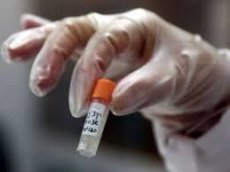New publications
Zmapp's new drug against Ebola virus showed 100% efficacy in animal study
Last reviewed: 02.07.2025

All iLive content is medically reviewed or fact checked to ensure as much factual accuracy as possible.
We have strict sourcing guidelines and only link to reputable media sites, academic research institutions and, whenever possible, medically peer reviewed studies. Note that the numbers in parentheses ([1], [2], etc.) are clickable links to these studies.
If you feel that any of our content is inaccurate, out-of-date, or otherwise questionable, please select it and press Ctrl + Enter.

American experts conducted a study of a new drug against Ebola fever – Zmapp, which showed 100% effectiveness in animal experiments.
For the experiment, scientists selected 21 monkeys that were infected with the Ebola virus. The specialists gave 18 animals an experimental vaccine and as a result, even those animals that were vaccinated at a late stage of the disease – five days after the disease – recovered (in monkeys, three days after infection, the virus becomes fatal). Three monkeys that did not receive the experimental drug died approximately three weeks after the onset of infection.
Experts noted that even if clinical trials on humans currently show good results, the vaccine could not be launched into production for at least several months.
According to the World Health Organization, three thousand people have been affected by the Ebola virus, and more than 1,500 patients have died from this hemorrhagic fever. But experts believe that the number of cases may actually be much higher.
Zmapp is considered a "secret drug" because the vaccine is currently in development. The Zmapp vaccine has previously been tested on humans, but the drug does not show the expected effect (out of four patients who received the vaccine, two died). Despite the use of the drug against the Ebola virus, a Spanish priest and a doctor from Liberia died, but two doctors from the US were successfully cured.
Given the rapid spread of the virus, the World Health Organization has previously authorized the use of anti -Ebola drugs that have not yet undergone clinical trials in humans.
The WHO currently considers the Ebola virus a threat of international concern. The virus is spreading much faster than experts had expected. Authorities in Sierra Leone and Liberia have already declared a state of emergency.
During the epidemic, more than 1,500 people died from the virus fever in Guinea, Sierra Leone, Nigeria, and Liberia.
Scientists recently determined that the disease began to spread after the death of a Liberian healer who treated Ebola hemorrhagic fever. The first twelve people infected with the virus were at the healer's funeral.
Scientists from the US and Africa have noted that the virus that is affecting the population of Africa is a mutated consequence of the virus that affected the population about ten years ago. As the authors of the research project believe, the modern virus is mutating at a rate twice as high as was noted in previous periods of the epidemic outbreak, in addition, the substitutions in the genome exceed the level above average.
Scientists have now discovered more than 400 mutations of the dangerous virus, which, in their opinion, may help to clarify the reason why the epidemic is becoming so severe. The modern Ebola virus is more dangerous than previously thought, and five specialists have already died while working with it.
